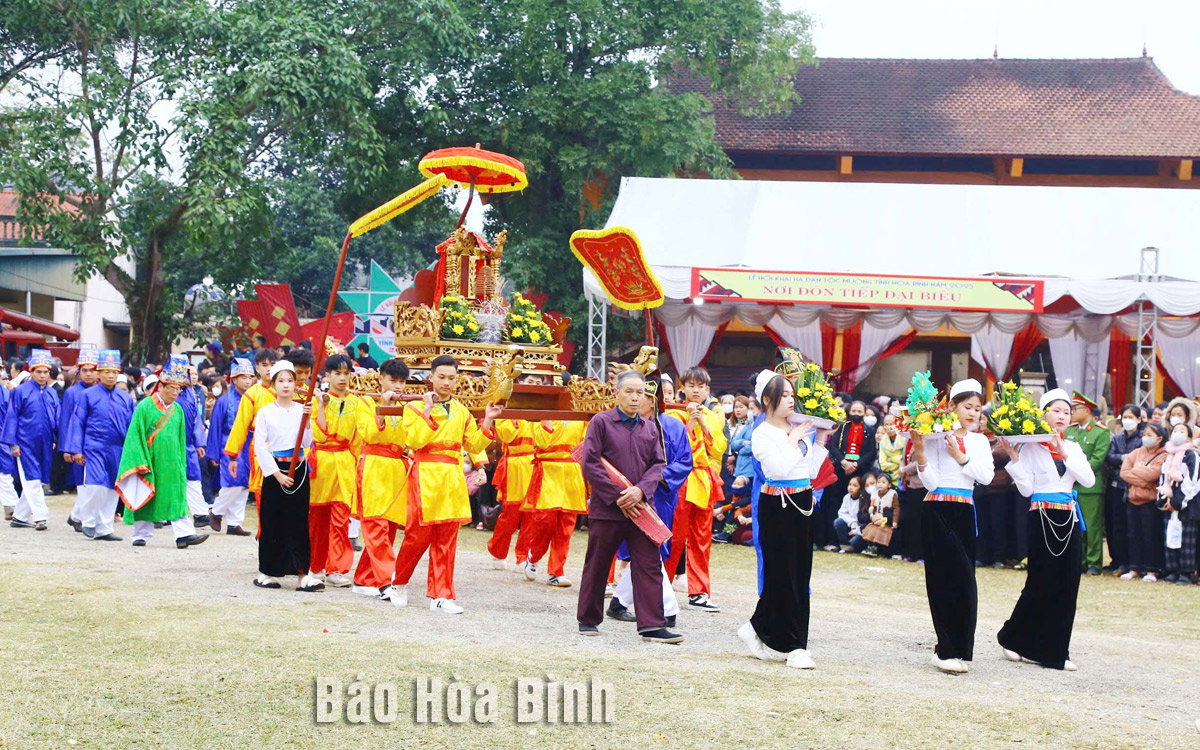
The Khai Ha (Going down to the field) Festival of the Muong ethnic group in Hoa Binh province is a vibrant cultural event that draws thousands of local people and tourists each year. Held in Phong Phu commune, Tan Lac district, this festival is deeply rooted in the spiritual and agricultural traditions of the Muong people.
The ceremonial procession carries the deity’s palanquin from Luy Ai hamlet to the Phong Phu stadium in Tan Lac district.
From the early morning of February 5 (the 8th day of the first lunar month), crowds of local people and visitors gathered to take part in the festivities.
Nguyen Hoa Thuy, a visitor from Hanoi's Hoang Mai district, said that this is the first time she has experienced the festival, and she was deeply impressed by its large-scale organisation, diverse activities, and captivating performances, especially the mesmerising Muong gong performance.
As the largest traditional folk festival of the Muong people in Hoa Binh, Khai Ha holds a special place in the hearts of the community, particularly in the four major Muong regions - Bi, Vang, Thang, and Dong. The festival is dedicated to honouring deities, paying tribute to ancestors who founded the land, and praying for favourable weather, abundant harvests, and prosperity. Each Muong region celebrates the festival at different times and locations, adding to its rich cultural diversity.
In recent years, the festival has seen a growing number of Muong ethnic people returning to their hometowns to take part in the celebrations, especially as the Lunar New Year (Tet) approaches.
This year, the festival took place on February 4 and 5 (the 7th and 8th days of the first month of Year of the Snake) and featured a dynamic mix of ceremonial rituals, cultural performances, traditional folk games, and sports competitions.
The celebrations began with a ritual of worshipping the local deity, followed by a deity’s palanquin procession to the festival venue at Phong Phu Stadium.
At the opening ceremony, an ensemble of Muong gongs filled the air, setting the stage for the grand festivities. Delegates and local people then participated in the festival’s symbolic tradition of going down to the field, marking the beginning of spring and a new agricultural season.
Beyond its spiritual and ceremonial aspects, the festival also showcased a variety of cultural and artistic performances, including brocade weaving demonstrations, folk games, singing and sports competitions and display of traditional Muong culinary.
Additionally, an One Commune One Product (OCOP) and agricultural product exhibition featured local specialties and handicrafts from the four Muong regions. A job fair was also organised to provide career guidance and networking opportunities for attendees.
Recognising its profound cultural significance, the Ministry of Culture, Sports, and Tourism officially recognised the Khai Ha Festival as a national intangible cultural heritage in 2022. Since 2023, the festival has been celebrated on a provincial scale, attracting even greater attention from local people and tourists.
The event is part of a broader initiative to preserve and promote Muong cultural values under Hoa Binh province’s 2023-2030 cultural development plan. Through this initiative, the festival not only showcases the rich traditions, scenic landscapes, and warm hospitality of Hoa Binh but also strengthens the region’s identity as a cultural and tourism hotspot.
The festival is held annually to educate future generations on patriotism, national pride, promoting historical and cultural values while raising awareness about preservation and fostering ethnic cultural identity associated with developing typical tourism products, so that culture truly becomes a spiritual foundation, internal resource and driving force for development.
With an increasingly vibrant and widespread emulation movement aimed at building cultured residential areas and cultured families, Yen Thuy District has been making steady progress toward improving both the material and spiritual well-being of its people, while fostering a civilized, prosperous, beautiful, and progressive community.
Once lacking recreational spaces and community facilities, Residential Group 2 in Quynh Lam Ward (Hoa Binh City) has recently received attention for the construction of a new, spacious, and fully equipped cultural house. The project followed the model of state support combined with public contributions in both labor and funding.
The "All people unite to build cultural life" movement, which has been effectively integrated with Kim Boi district’s socio-economic development goals, is fostering a lively spirit of emulation across local residential areas, hamlets, villages, public agencies, and enterprises. In addition, through the initiative, traditional cultural values are being preserved and promoted, while community solidarity and mutual support in poverty reduction and economic development are being strengthened.
A working delegation of the Hoa Binh provincial People’s Committee led by its Permanent Vice Chairman Nguyen Van Toan on June 11 inspected the progress of a project to build the Mo Muong Cultural Heritage Conservation Space linked to tourism services in Hop Phong commune, Cao Phong district.
Born and growing in the heroic land of Muong Dong, Dinh Thi Kieu Dung, a resident in Bo town of Kim Boi district, in her childhood was nurtured by the sweet lullabies of her grandmother and mother. These melodies deeply imprinted on her soul, becoming an inseparable part of her love for her ethnic group's culture. For over 20 years, this love for her hometown has driven Dung to research, collect, and pass down the cultural values of the Muong people to future generations.
In the final days of May, the Ethnic Art Troupe of Hoa Binh Province organized performances to serve the people in remote, mountainous, and particularly disadvantaged areas within the province. These were not just ordinary artistic shows, but they were the meaningful journeys aimed at spreading cultural values, enhancing the spiritual life of the people and contributing to the preservation of ethnic minority cultural identities.



